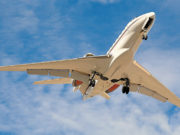The U.S. Senate this week confirmed the nominations of Bruce Landsberg and Jennifer L. Homendy to serve on the National Transportation Safety Board (NTSB). The action brings the NTSB back to a full complement of five members.
Landsberg, a former president of the Aircraft Owners and Pilots Association (AOPA) Foundation and executive director of the AOPA Foundation Air Safety Institute, is a noted general aviation safety expert and advocate, and a pilot. His nomination to the NTSB in September 2017 was lauded by various industry groups, including the National Business Aviation Association, but it drew opposition from other quarters because of Landsberg’s stance on the so-called 1,500-hour rule. Landsberg has been quoted as saying that he believes in “performance-based regulation as opposed to an arbitrary, one-size fits all rule.”
The 1,500-hour rule requires first officers, with some exceptions, to have accumulated at least 1,500 flight hours and an air transport pilot certificate before being hired. The rule took effect in 2013 as a result of legislation passed in response to concerns voiced by families of some of the 50 people killed in the Feb. 12, 2009, crash of Colgan Air Flight 3407, a Bombardier Q400 on approach to Buffalo Niagara (New York) International Airport.
NTSB’s investigation of the accident concluded that the captain’s handling of the controls caused the airplane to stall and said that his actions were a result of “startle and confusion,” not a product of his training. Both the captain and the co-pilot had more than 1,500 flight hours.
In June, Department of Transportation Secretary Elaine Chao, in an interview with The Washington Post that was part of a webcast discussion of issues facing the U.S. aviation industry, said, “There needs to be a robust discussion,” primarily in Congress, about the 1,500-hour rule, which “has certainly made it so much harder” for many pilots — “pilots who can very safely fly in our skies” — to advance into airline flight jobs.
Flight Safety Foundation, in a position paper issued in March, urged the aviation industry to adopt a “data-driven approach to pilot training” that would encourage competency-based or evidence-based training methods rather than strict adherence to a flight hour requirement. In the paper, the Foundation said, “Although for many years, the number of accumulated flight hours has been the baseline for determining experience, what is often overlooked in the pilot experience equation is the quality of flight time. … Relying solely on a number does not effectively capture a pilot’s true experience. The type of experience and the flight environment must be considered to provide meaning to the number.”
Landsberg’s term expires Dec. 31, 2022.
Homendy was nominated in April to fill unexpired term of former board member Mark R. Rosekind, who resigned from the board. She has been serving as the Democratic staff director of House Transportation and Infrastructure Committee’s Railroads, Pipelines and Hazardous Materials Subcommittee.
Her term expires Dec. 31, 2019.
